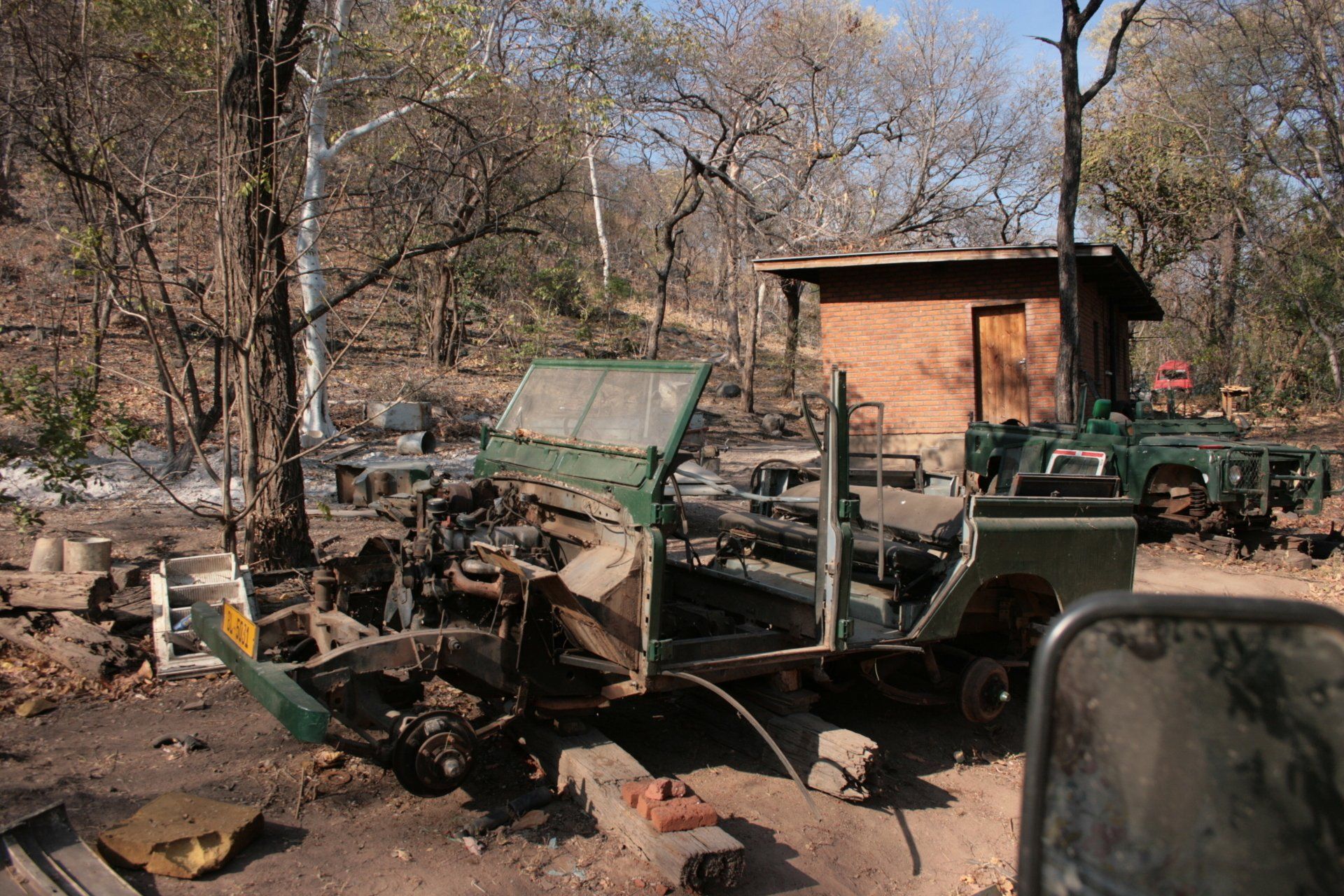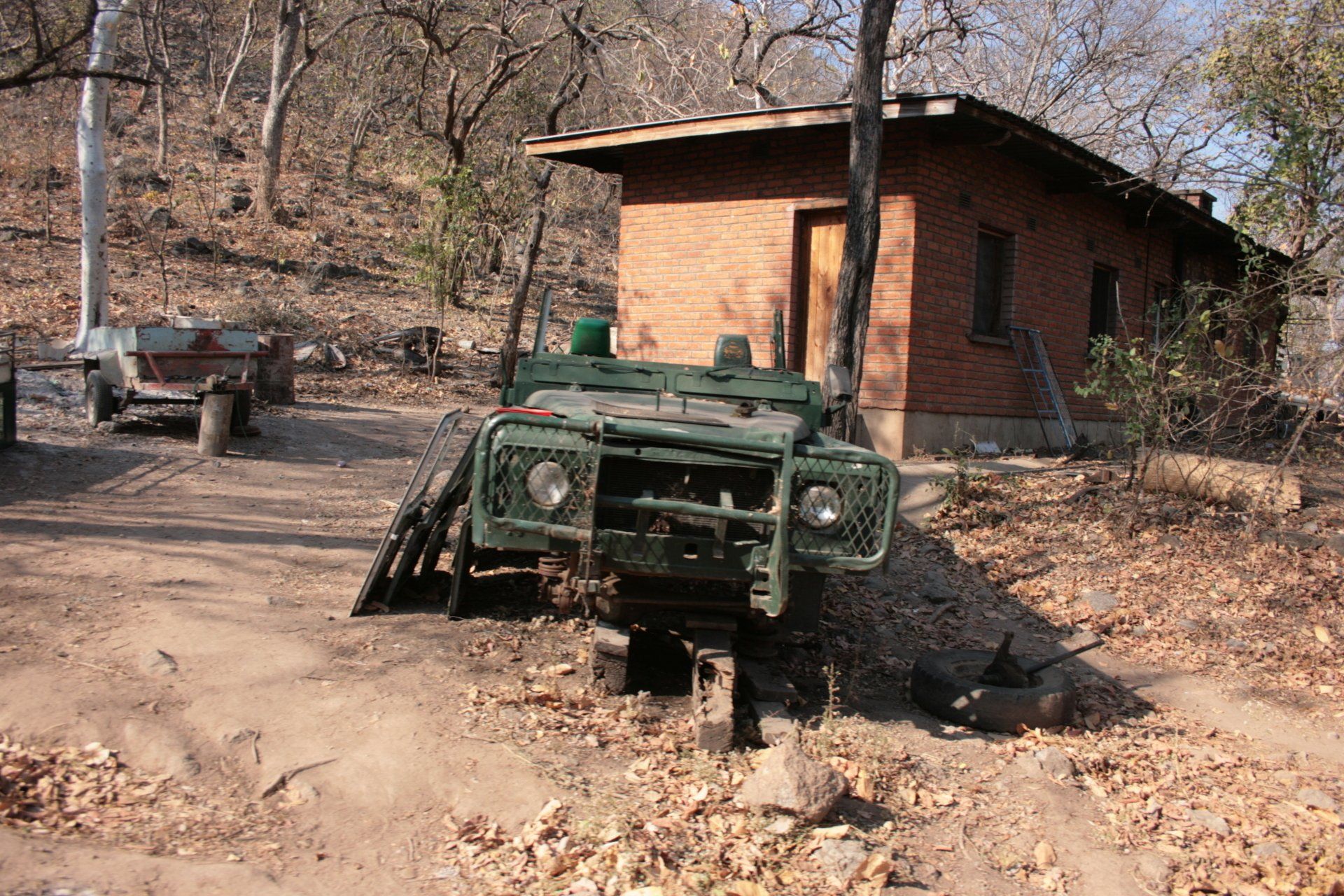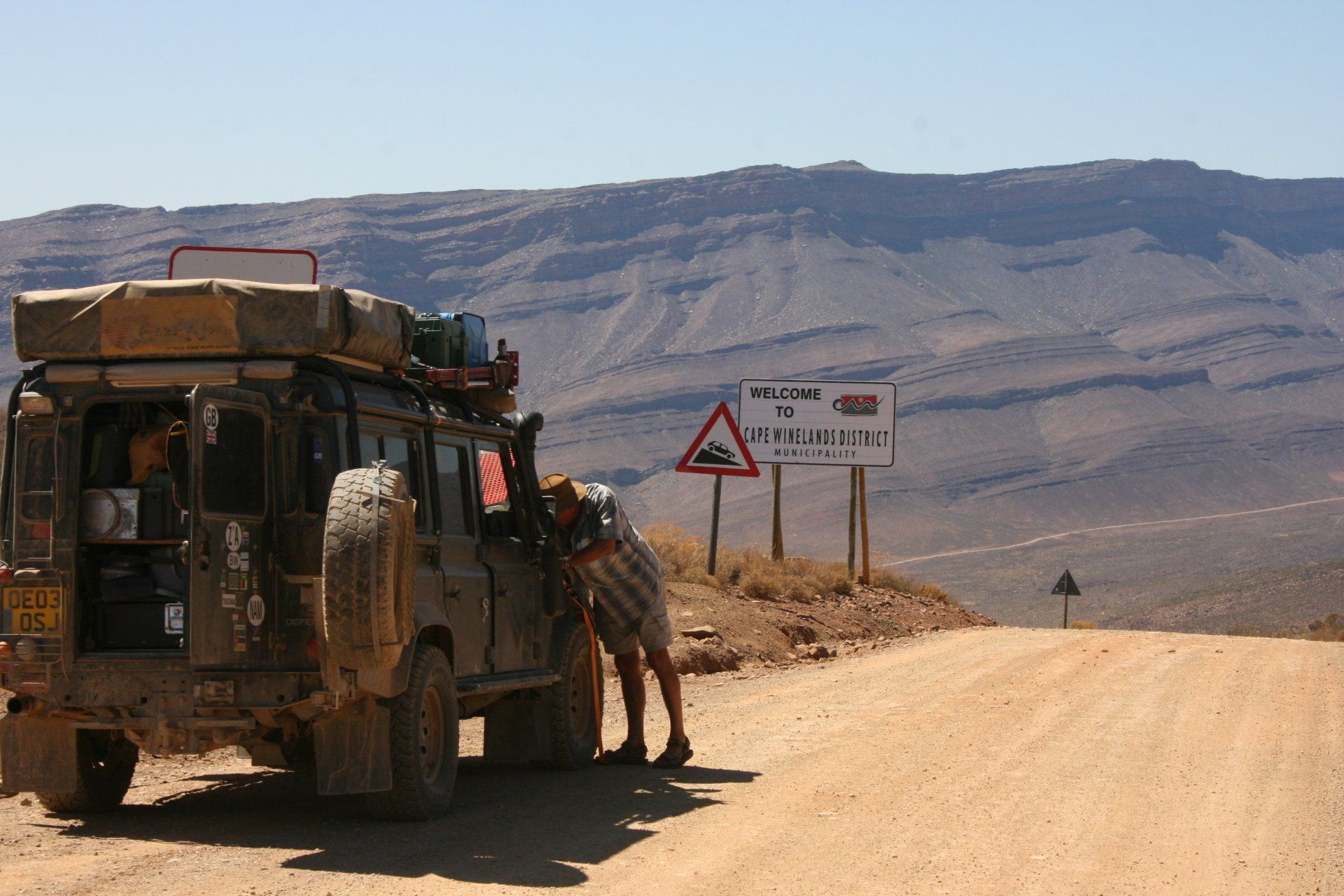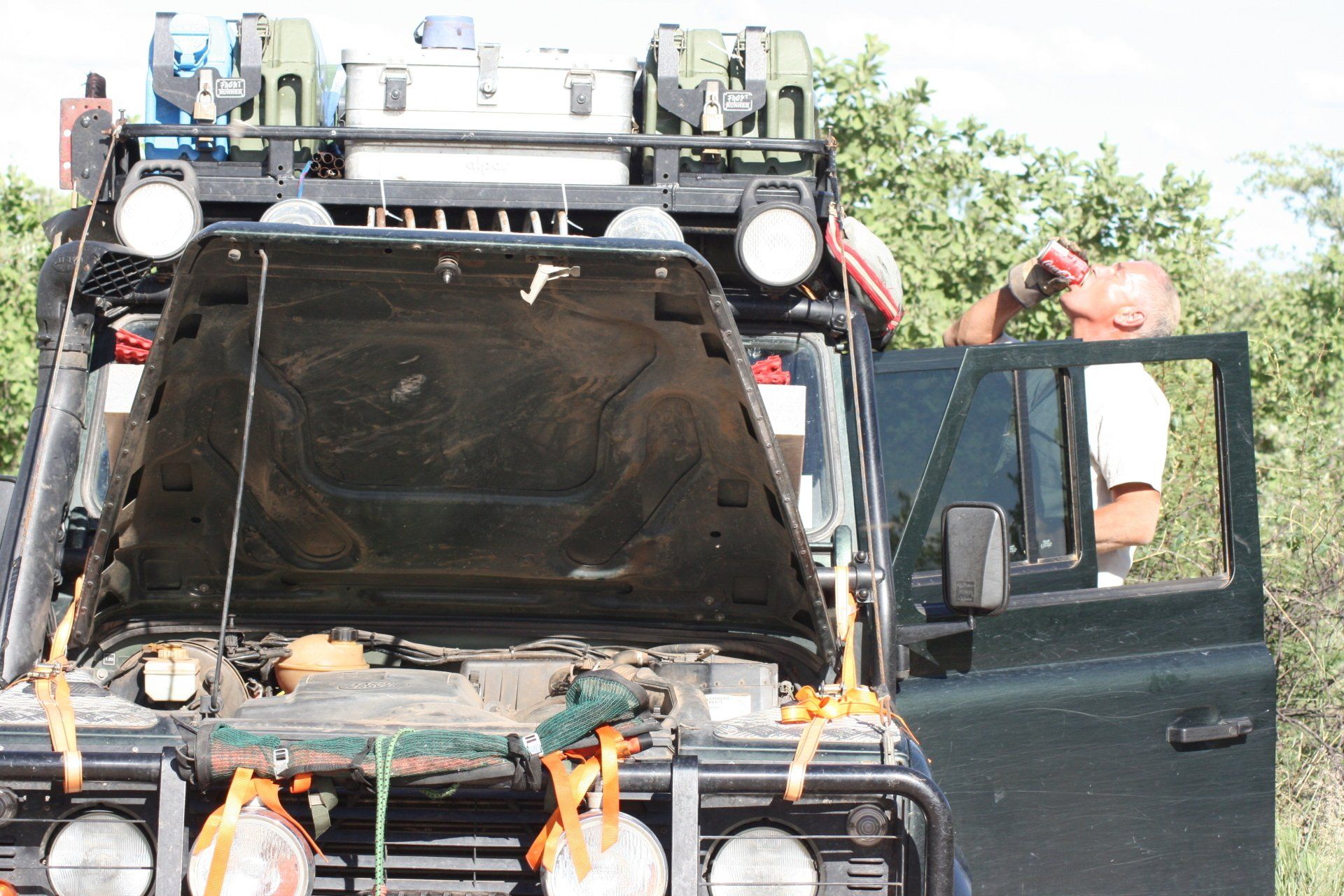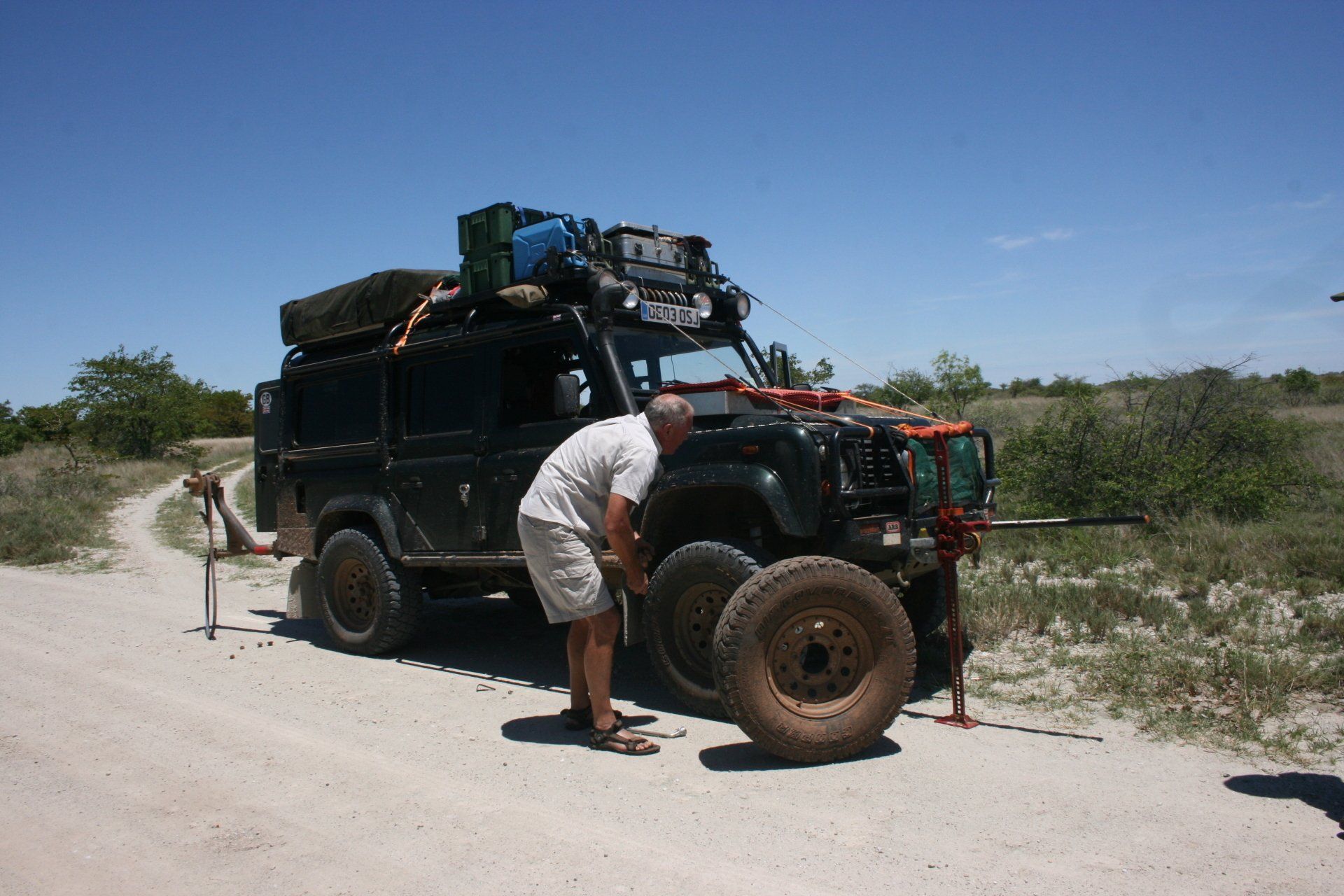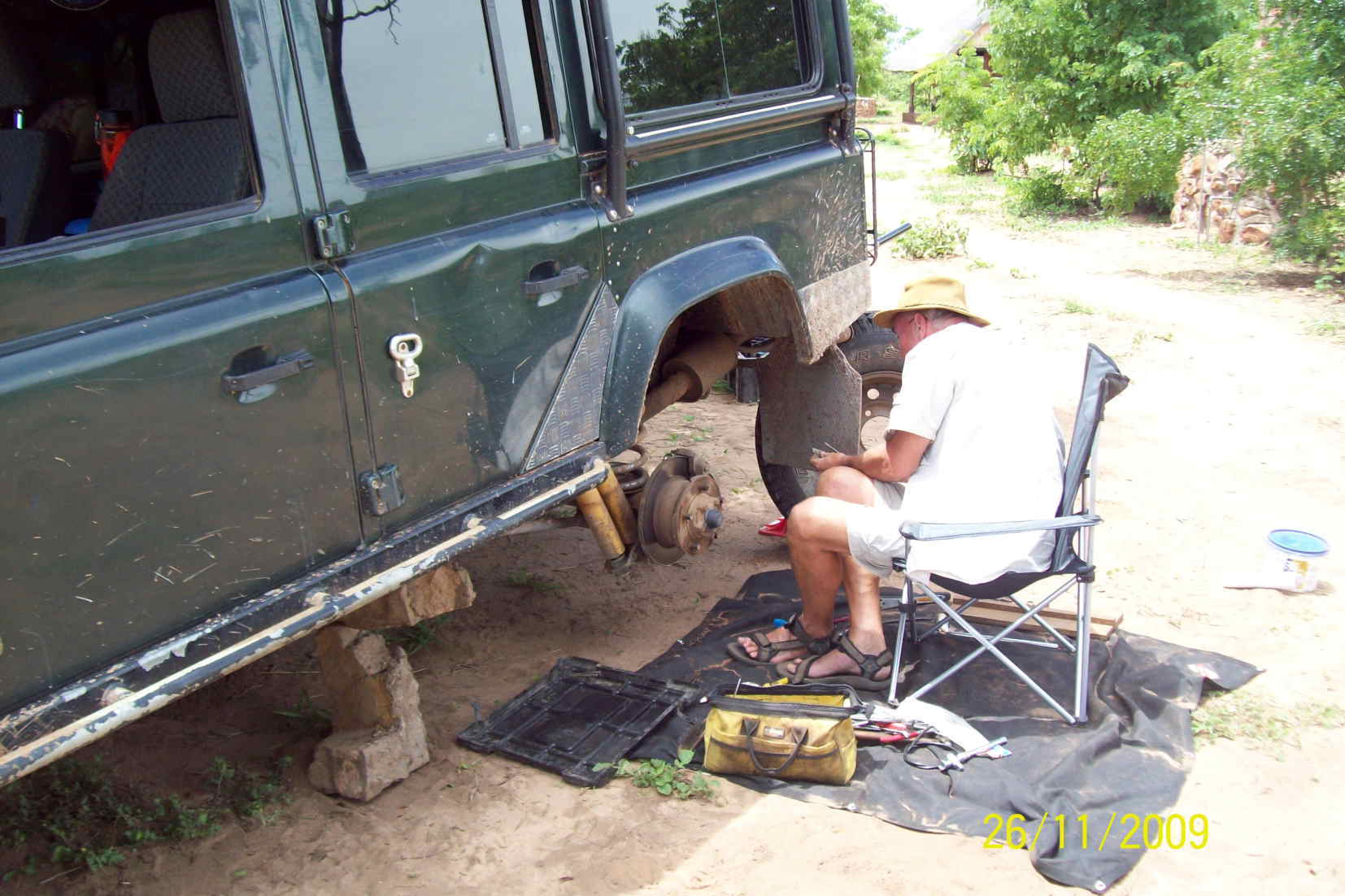Vehicle - general issues
VEHICLE GENERAL
Mechanics course
Knowing we would be doing many kilometres other than on smooth tar it was accepted that we would need to have some knowledge of the vehicle to keep it going. My mechanical prowess was limited to several years ago keeping relatively simple family cars going. Both Judi and I arranged through the company who did much of the vehicle preparation to accompany the mechanic for the day as he carried out a full service and check over. This gave us the basics and some knowledge of the various components: whilst much of a Land Rover Defender hasn’t changed in years, the engines certainly have.
Most large towns have a garage and mechanics and many campsites and lodges that run game viewing vehicles will have mechanics that will be more than happy to help out. The larger towns will probably have a Toyota garage and the largest will have a Land Rover garage – worth trawling the internet to get addresses of relevant garages for your route. ‘Bush’ mechanics are legendary at keeping old vehicles on the road and will be able to fix most mechanical problems with the most basic of tools. They are, however, not so hot on modern electrics and computers. I would probably consider taking a diagnostic computer next time.
Spares and Tools
Your vehicle is going to be your home for however long and will need lots of TLC to keep going.
For the length of our trip and the miles we were going to do, in extreme conditions it was reasonable to expect there to be maintenance and repair issues. The vehicle was checked frequently, daily in arduous conditions and regular servicing was scheduled to coincide with visits to major cities. The conundrum is what to take and what not to take. I took a Haynes Workshop manual and a Land Rover Workshop Manual & Electrical Manual – manuals are also available to download. I took two wolf boxes full of spares* and tools** along with a general tool box and socket set. I also took an electric drill but this did take up a fair amount of space!
The cost of Land Rover spares in Africa was much more expensive than back in the UK so take plenty of “consumables” such as brake pads, service items, drive belts, etc. – you will need them. Many garages haven’t got the parts readily available so you providing them will get you back on the road much quicker
*Fuel pressure regulator; fuel filters; oil filters, both types; 2 drive belts; wheel bearings (standard TD5 set-up replaced with adjustable bearings); various oil seals; rear lower link radius arm bushes; half-shafts; full set of coolant hoses; starter motor (having replaced it on Day 18); front coil and shock absorber (courtesy of Day 281); part worn brake pads (should have taken several new ones instead); several boxes of assorted screws; nuts; bolts, etc. etc.; electrical wire; rad weld; exhaust bandage & gum; copper grease; WD40; assorted pop rivets; assorted rubber pipes; copper brake pipe; several rolls of duct tape; assorted bulbs and fuses; spare relays; brake fluid (purchased in South Africa (kept under the counter!)); small quantity engine oil – this list could be inexhaustible!
It is worth taking plenty of spares, space permitting, even if the fitment is beyond the level of one’s competency as they can be supplied to your African mechanic if required. Would now consider taking a spare alternator and ECU.
** In additional to a full set of ‘usual’ tools: Wheel bearing box spanner; 2x 9/16” open-ended and ring spanners (for prop shaft nuts and bolts); double set of metric spanners up to 32 mm; socket set; pipe wrench; large adjustable spanner; various levers; bolt extractors; nut splitter; pullers; torx socket set; hex allen keys; torque wrench; gas soldering iron set; grease gun & grease; pop riveter; pipe flaring tool + length of copper brake pipe; jump leads – this list too could be inexhaustible!
It is worth taking some of the specialist tools even if only to lend to your African mechanic.
Vehicle Issues and work done on return
Starter Motor – failed in shipping container on arrival at Cape Town & replaced.
Recurring electrical fault - causing occasional overheating, possibly due to defective relay or temperature sender. Never actually completely cured.
Diesel leak – perished fuel return pipe above fuel tank replaced in South Africa.
Front Brakes – pads replaced on second Botswana visit.
Rear Brakes – pads replaced in Malawi and on second Botswana visit along with discs.
Wheel bearings – frequently adjusted; rear nearside seals renewed in Tanzania. (standard TD5 fitted with non-adjustable bearings which are fine until they fail – easier to convert to pre-TD5 set-up)
Shock absorber bracket – rear nearside axle bracket repaired by welding in Tanzania. Failed again in UK - new bracket welded on. (should have taken spare brackets)
ARB Rear Differential Air Lockers – packed up in Malawi and eventually repaired in Johannesburg.
Oil cooler - allowing oil into coolant water and caused by using plain water in coolant instead of antifreeze, which also acts as a corrosion inhibitor – a common problem in Africa, apparently, where the oil and water matrix corrodes through. Replaced in UK.
Exhaust Manifold – whilst replacing oil cooler found the two outside manifold studs were broken. It turned out the manifold was warped and accounted for whistling noise firstly heard on second visit to South Africa); a fairly common fault by all accounts – replaced in UK.
Turbo Charger – declared faulty early on in trip but left alone until removed as part of the oil cooler strip. Sent for overhaul but replaced in UK.
Coolant hoses – all replaced with spares as part of oil cooler decontamination.
Tyres – 2 replaced as part of UK MoT due to torn tread blocks exposing cord rather than depth of tread (still plenty).
Half-shafts – failed in UK and replaced.
Drive Shaft Flanges – rears replaced with heavy duty ones to prevent cap losses – one also very badly worn allowing half-shaft to work out. Carried out in UK.
Rear radius lower link arms – standard ones replaced in UK with cranked ones to reduce stresses and rear offside axle bracket replaced. Offside mounting bolt replaced in Zambia and South Africa.
Gearbox leak – work carried out in UK to fix oil leak between main and transfer box – new seal and O ring fitted.
Overdrive Unit – finally removed in UK. Should have done this prior to trip as responsible for regular oil leaks after service.
Brake pipes – a couple replaced; bent rather than corroded.
Rear Prop Shaft UJ – replaced in UK
Front Coils & Shock Absorbers – the second-hand ones fitted in Botswana second visit replaced in UK with heavy load 50 mm lift coils and shock absorbers with twin shock fittings. Extra shock absorber removed due to much reduced turning circle – not really required for UK work so will retain for future African trips. Heavy load front springs later replaced with medium load ones to reduced amount of lift. Rear springs and shocks also replaced sometime after return.
Front Prop Shaft – standard replaced with Discovery double carden set up to compensate for body lift. The central double UJs attempted to be repaired but central needle bearing found to have lost a few needles (One UJ was replaced in Namibia). Whole shaft replaced but that too disintegrated within 2 months – old one repaired with bits from new one. Replacement obtained under warranty. (Linked with front coil springs lift)
Battery - New Optima red top & yellow top battery fitted in UK.
Roof tent cover – stitching renewed by Judi but eventually we will need to purchase a replacement. (Replaced 2012)
Front radius arm bushes (Castor corrected) – renewed back in UK.
